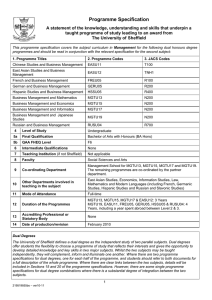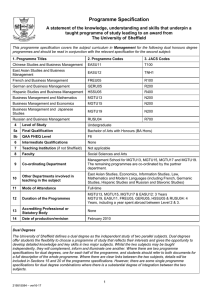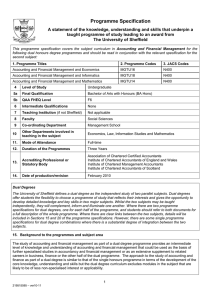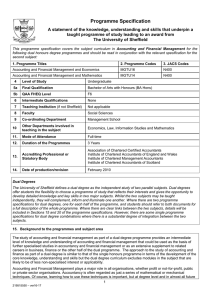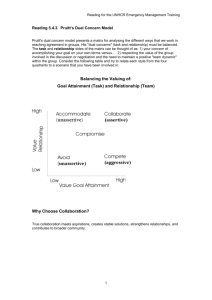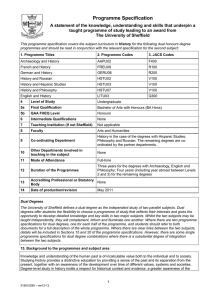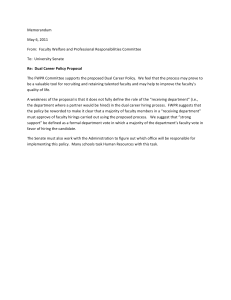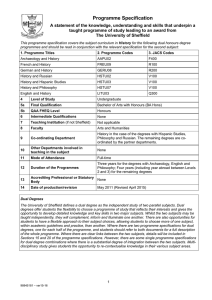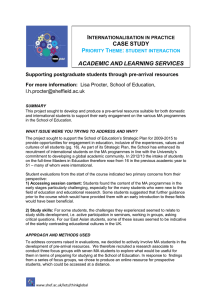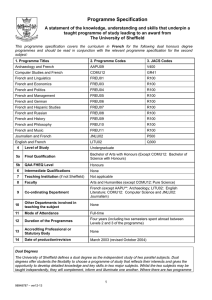Management programmes and should be read in conjunction with the relevant...
advertisement
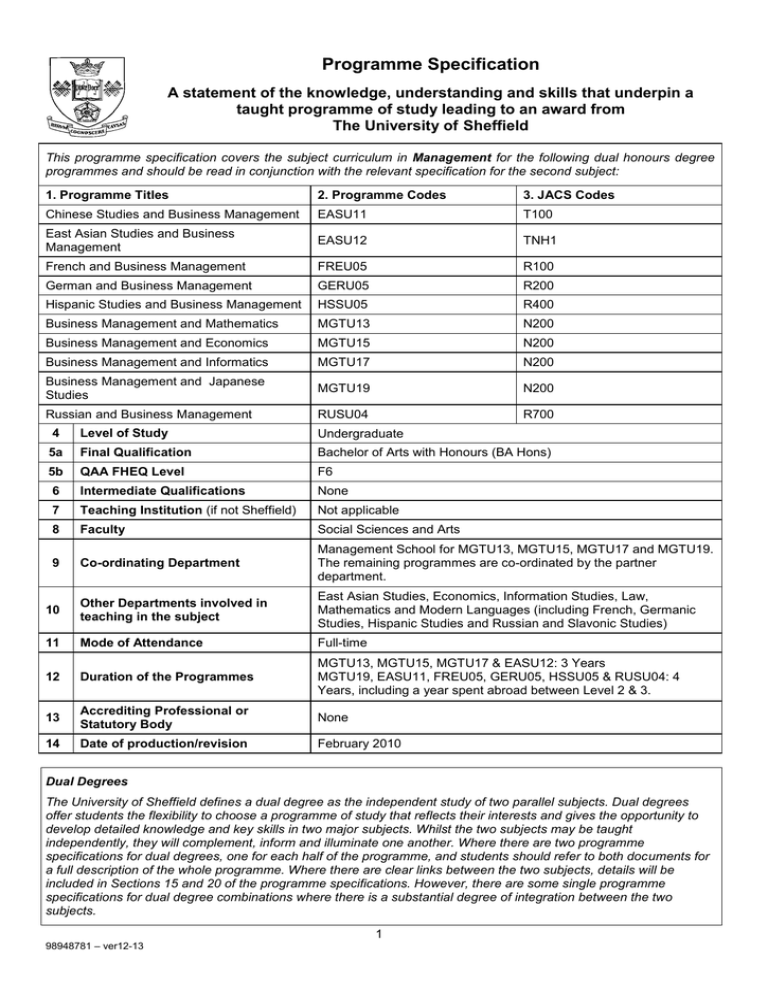
Programme Specification A statement of the knowledge, understanding and skills that underpin a taught programme of study leading to an award from The University of Sheffield This programme specification covers the subject curriculum in Management for the following dual honours degree programmes and should be read in conjunction with the relevant specification for the second subject: 1. Programme Titles 2. Programme Codes 3. JACS Codes Chinese Studies and Business Management EASU11 T100 East Asian Studies and Business Management EASU12 TNH1 French and Business Management FREU05 R100 German and Business Management GERU05 R200 Hispanic Studies and Business Management HSSU05 R400 Business Management and Mathematics MGTU13 N200 Business Management and Economics MGTU15 N200 Business Management and Informatics MGTU17 N200 Business Management and Japanese Studies MGTU19 N200 Russian and Business Management RUSU04 R700 4 Level of Study Undergraduate 5a Final Qualification Bachelor of Arts with Honours (BA Hons) 5b QAA FHEQ Level F6 6 Intermediate Qualifications None 7 Teaching Institution (if not Sheffield) Not applicable 8 Faculty Social Sciences and Arts 9 Co-ordinating Department Management School for MGTU13, MGTU15, MGTU17 and MGTU19. The remaining programmes are co-ordinated by the partner department. 10 Other Departments involved in teaching in the subject East Asian Studies, Economics, Information Studies, Law, Mathematics and Modern Languages (including French, Germanic Studies, Hispanic Studies and Russian and Slavonic Studies) 11 Mode of Attendance Full-time 12 Duration of the Programmes MGTU13, MGTU15, MGTU17 & EASU12: 3 Years MGTU19, EASU11, FREU05, GERU05, HSSU05 & RUSU04: 4 Years, including a year spent abroad between Level 2 & 3. 13 Accrediting Professional or Statutory Body None 14 Date of production/revision February 2010 Dual Degrees The University of Sheffield defines a dual degree as the independent study of two parallel subjects. Dual degrees offer students the flexibility to choose a programme of study that reflects their interests and gives the opportunity to develop detailed knowledge and key skills in two major subjects. Whilst the two subjects may be taught independently, they will complement, inform and illuminate one another. Where there are two programme specifications for dual degrees, one for each half of the programme, and students should refer to both documents for a full description of the whole programme. Where there are clear links between the two subjects, details will be included in Sections 15 and 20 of the programme specifications. However, there are some single programme specifications for dual degree combinations where there is a substantial degree of integration between the two subjects. 1 98948781 – ver12-13 15. Background to the programmes and subject area The study of Business Management as part of a dual degree programme provides a core level of knowledge and understanding about the broad multi-disciplinary area of Management. The core business functions covered include human resource management, marketing, operations management and organisational behaviour. This variety of subjects ranges from the mathematical to those with a major emphasis on narrative description and analysis, reflecting the diverse reality of business environments. The multifaceted aspect of the programme reflects the nationally agreed view of what a degree in Management should contain in its core. Beyond the broad introductory Level 1 subjects, there is a consideration of contemporary issues in Business depending on the options chosen, and students are required to undertake project and individual work at a level that is intellectually rigorous and demanding. The Business Management aspect of a dual programme is therefore a blend of the theoretical and the practical, with the practical side explored through the extensive use of case studies, and specific project work in a number of modules. This merging of the theoretical and the practical is reflected in the close links between staff research and teaching contributions, and in the research strategy of the Management School. The research strategy reflects the 4 broad research clusters of Human Resource Management, Strategy, Accounting and Financial Management and Marketing. Research themes within these clusters and individual staff interests contribute to contemporary debates, practices and policy developments, and demonstrate the benefits of research-linked teaching, particularly in the range of options offered at Level 3. There are particular research specialisms including corporate social responsibility, occupational psychology, marketing communications, industrial relations. Dual students graduate with key critical abilities, the capacity to apply theoretical rigour to practical business problem solving, transferable ICT and other communication skills, and a level of practical experience on which to build a successful career. The skills and intellectual training provided by a dual degree which includes Business Management are valued by employers and reflected in the wide range of employment destinations of graduates. Further information about the Management School is available on our website at http://www.shef.ac.uk/management 16. Programme aims Business Management dual degree programmes offered by the Management School have the following general aims consonant with the University’s mission statement: 1. To provide students with high quality teaching and learning experiences that are research-informed, and consistent with sustaining a culture of research, and alert to the benefits of student centred learning. 2. To provide students with core knowledge and understanding of the environment, organisation and management of profit and not for profit business. 3. To develop students’ independence of thought, intellectual curiosity, and an appreciation of critical and analytical approaches to management theories, related concepts and underpinning assumptions. 4. To develop appropriate communication, quantitative and research skills in all students. 5. To develop students’ ability to make sound judgements, solve problems, cope with change and work effectively in groups. 6. To prepare students for future employment and/or further study. 2 98948781 – ver12-13 17. Subject learning outcomes Knowledge and understanding - On completion of the programme students will have: K1 Knowledge and understanding of the foundation disciplines of organisation behaviour, consumer behaviour and human resource management. K2 Knowledge and understanding of the roles and uses of financial accounting, management accounting, and financial management in business organisations. K3 Knowledge and understanding of the roles and responsibilities of managers and organisations in society. K4 Knowledge and understanding of concepts and theories in marketing. K5 Knowledge and understanding of the behaviour of people at work. K6 Thorough understanding of the interdisciplinary nature of the management field. Generic skills and other attributes - On completion of the programme students will be able to: S1 Display initiative and creativity, working effectively as an individual and as part of a team. S2 Communicate successfully in written and oral form in a manner appropriate to the context, including the production of academic essays, business reports and presentations. S3 Employ a range of IT skills including word processing, presentation formats and the Internet. S4 Demonstrate cognitive skills of critical thinking, analysis and synthesis. S5 Demonstrate effective problem solving, using appropriate qualitative and quantitative techniques. Specific skills and other attributes - On completion of the programme students will be able to: S6 Apply the principles of management theory in appropriate contexts. 18. Teaching, learning and assessment Development of the learning outcomes is promoted through the following teaching and learning methods: 1. Induction procedures occur at the beginning of Level 1 and are designed to develop the basic bibliographic and study skills, and orient the student to the School and its procedures and the local intranet. Other basic skills, including problem solving skills (S5), are taught throughout Level 1. Further study skills advice is available to all students via the School’s web site. 2. Formal Lectures are used throughout the 3 Levels to introduce students to essential bodies of knowledge and the principal arguments in particular fields, relating to K1-K6 above. 3. Seminars may be staff-led or student-led, and their use is extensive at Level 1 and beyond. They are designed to reinforce and extend knowledge imparted through lectures and to develop critical capacities by allowing students to work through, analyse, understand and respond to that information. Often they involve guided reading of practical case analysis (S6) and relevant theoretical application, to fulfil the aim of exposing students to as much authentic business material as possible. In some subject seminars role-playing and simulations are used so that the learning and understanding are developed experientially. The seminar process also involves students working in small groups (S1) to give presentations (S2 & 3) of their analyses (S4), drawing on a range of sources. Seminars thus contribute both to the achievement of knowledge and understanding (K1-K8) and to the development of key skills (S1-S6). 4. Group work outside of seminars encourages and enables students to develop skills and understanding through debate and collaborative working, learning from the experience and background of others in the group (S1, S2 & S5). 5. Independent study is essential at all Levels for successful completion of the programme. The amount of independent study broadly expected for each module is clearly set out in the module outline, although it is recognised that this will vary from student to student. Independent study is generally geared towards the assimilation and further clarification of material gleaned from lectures, preparation for seminars, preparation for written assessments, and the broader development of knowledge of the field of study. The provision of module web sites and detailed handouts provide more basic material for students to study away from lectures. Independent study thus contributes to the development of all programme learning outcomes, but is especially important in refining skills S4-S6. 6. Computer aided learning is available at all Levels so that students can broaden their knowledge and understanding of the various disciplines (K1-8), in their own time and at their own pace (S3-5), using materials formulated by staff specifically for this method of learning. 3 98948781 – ver12-13 Opportunities to demonstrate achievement of the learning outcomes are provided through the following assessment methods: 1. Regular formative assessment is used at all Levels to monitor students’ progress and provide feedback about knowledge and understanding gained (K1-6), providing an arena for identifying and rectifying students potential weaknesses, as well as contributing to formal assessment in some instances. Similarly, a portfolio of evidence demonstrates that students have gained the required IT skills (S3). 2. Presentation performance, individually and as part of a team, is formally and informally assessed for content and process in many modules, especially at Level 3 (S1-5). In addition to testing the students’ analytical skills and relevant theoretical understanding, this provides an opportunity to assess the students’ oral communication skills, and prepares them for the presentation processes common in the business world. This procedure also includes opportunities for peer review assessment, when group members can allocate marks for the effort and involvement shown by each individual in the group process. This also provides an opportunity for personal reflection on performance. 3. Written assignments, comprising essays, case analyses and reports, are judged against publicised marking criteria, and are expected to be well written and presented. These are used to test the students’ acquisition of key skills (S2-5) as well as theoretical knowledge and critical understanding (K1-8). Group project reports provide opportunities for independent or group studies of a specific business related issue/problem, and are used to test K1- 8 and S1. 4. Formal examinations are used to test students’ theoretical understanding and critical abilities (K1-6), together with the ability to draw from memory and to write informed, coherent answers under pressure of time (S2, 4, 6). The Department has systems in place to ensure that examining procedures are moderated and regulated. 19. Reference points The learning outcomes have been developed to reflect the following points of reference: The Management School’s Learning, Teaching and Assessment Strategy Subject Benchmark Statements http://www.qaa.ac.uk/AssuringStandardsAndQuality/subject-guidance/Pages/Subject-benchmark-statements.aspx Framework for Higher Education Qualifications (2008) http://www.qaa.ac.uk/Publications/InformationAndGuidance/Pages/The-framework-for-higher-educationqualifications-in-England-Wales-and-Northern-Ireland.aspx University Strategic Plan http://www.sheffield.ac.uk/strategicplan Learning and Teaching Strategy (2011-16) http://www.shef.ac.uk/lets/strategy/lts11_16 20. Programme structure and regulations The Management curriculum for the dual honours programmes trains students in business enquiry and techniques, developing an increasingly in depth approach to a range of disciplines which make up the business field: Level 1 is designed to give a broad overview of the interdisciplinary and diverse nature of the subject. The core modules include Introductions to Behaviour at Work, Management in Context, Business Challenge and Management themes and perspectives Level 2 comprises the core subjects of Business Strategy, Marketing and Organisational Behaviour. Building on the core modules of Level 1, the Level 2 core modules focus on the key topics, processes and techniques that comprise business management, customer and employee management and problem identification/solving. Level 3 One core module is provided in Corporate Social Responsibility, which reflects the increasing levels of sophistication and understanding necessary for the modern business environment. Specialisation in further optional modules allows students to follow their specific interests and explore subjects in greater depth, including International Marketing, Occupational Psychology, Industrial Relations, Law for Management, International Business and Creating New Business Ventures. Detailed information about the structure of programmes, regulations concerning assessment and progression and descriptions of individual modules are published in the University Calendar available on-line at http://www.shef.ac.uk/govern/calendar/regs.html. 4 98948781 – ver12-13 21. Student development over the course of study Level 1 is designed to provide a broad multidisciplinary foundation for dual management, concentrating on knowledge and understanding of the diverse range of underpinning subject material, and attaining the appropriate skill base. This is reflected in the make up of core foundation subjects, and in the focus on students acquiring a range of skills, particularly generic ones concerning IT, communications, and study skills. Level 2 promotes greater knowledge and critical understanding of the subject matter in core subjects. Building on the foundations laid at Level 1, this spine of progressively developing modules increases the students’ knowledge base and the critical appreciation of theories and concepts as applied to business issues and problems. Level 3 exploits and develops increased confidence and sophistication in students’ approach to the diversity of the subject area, including recognising and applying complementary, competing, and sometimes contradictory solutions to business issues. Students continue the development of their skills of critical analysis and investigation of management problems and their thinking about overarching issues and developments in the subject area. The option choices enable the students to focus on specific areas of interest, so that students become progressively more expert on particular topics central to effective business organisation and management. 22. Criteria for admission to the programmes Detailed information regarding admission to the programme is available at http://www.shef.ac.uk/prospective/ All enquiries should be made in the first instance to the Departmental Admissions Secretary at management@shef.ac.uk or Tel: +44 (0) 114 222 3372 23. Additional information None This specification represents a concise statement about the main features of the programme and should be considered alongside other sources of information provided by the teaching department(s) and the University. In addition to programme specific information, further information about studying at The University of Sheffield can be accessed via our Student Services web site at http://www.shef.ac.uk/ssid. 5 98948781 – ver12-13
